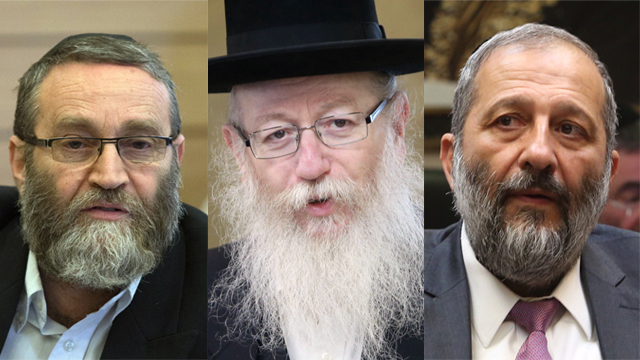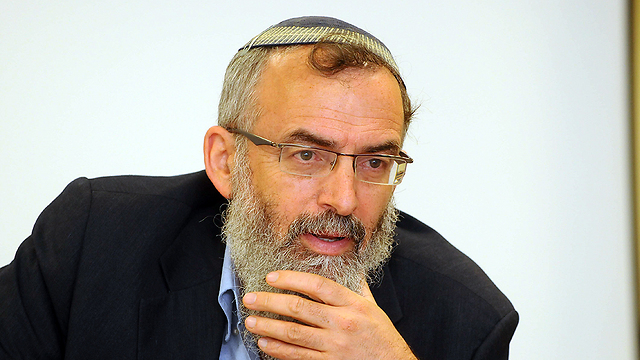
Tel Aviv market
צילום: עמית קוטלר
Orthodox politicians to fight Shabbat business ruling
Despite the politicians’ opposition, a prominent chief rabbi argues that religious authorities who want to promote the sanctity of religious law must inspire people to follow it, not force them.
Orthodox politicians said on Thursday that they would fight Wednesday’s High Court of Justice ruling permitting mini-markets to remain open on Shabbat.
Leaders of the ultra-Orthodox Shas and United Torah Judaism parties, as well as Bayit Yehuda Ministers Naftali Bennett and Uri Ariel called on Prime Minister Benjamin Netanyahu to convene an urgent session for coalition members to draft a series of measures to defend a verdict they consider a “breach in the walls of the Shabbat.”

Rabbis L–R: MK Moshe Gafni, Minister Yaakov LItzman, Minister Aryeh Deri (Photos: Gil Yohanan, Alex Kolomoisky & Ohad Zwigenberg) (צילום: אוהד צויגנברג, אלכס קולומויסקי, גיל יוחנן)
In addition, Interior Minister Rabbi Aryeh Deri (Shas) asked Attorney General Avichai Mandelblit to use his authority to ask the court to reconsider the issue with an expanded panel of judges, and Health Minister Rabbi Yaakov Litzman (United Torah Judaism) said his party would propose legislation that would seek to undermine the ruling. UTJ colleague MK Rabbi Moshe Gafni said the “poor” decision would turn Shabbat into a regular workday both in Tel Aviv and around the country.
Gafni also said the change in the religious status quo violates coalition agreements.
Notably, not all religious elements in Israel disagree with the ruling. The Hiddush organization, headed by Reform Rabbi Uri Regev and which bills itself as being “for religious freedom and equality,” hailed the decision, calling it a victory over religious coercion.
“The High Court of Justice acted in a balanced, responsible way, once again heeding the will of the overwhelming majority of the Israeli public, the core values of freedom of religion and conscience, as well as a profound respect for the Jewish Shabbat,” Hiddush said in a statement. “All proponents of democracy should welcome the court’s decision, which emphasizes the will of the local citizenry, and views this as a proper expression of Israel’s identity as a ‘Jewish and democratic’ state.”
Some Orthodox groups also welcomed the decision, or at least expressed concern about political threats to re-institute civil laws to enforce Shabbat observance. David Stav, the chief rabbi of Shoham and founder of the Tzohar rabbinic organization, told TPS that religious authorities who want to promote the sanctity of religious law must inspire people to follow it, not force them.
“Shabbat is a gift to the entire Jewish nation, and one of the foundation stones of the public sphere in the State of Israel.
“At the same time, the time has come for religious parties to understand that they cannot force people to observe Jewish law against their will via legislation,” Stav said.
Asked whether the pledge to fight the High Court ruling was more than a show of political power, Stav said he did not want to talk about politics. But he quickly added that if Orthodox politicians are truly committed to the preserving the sanctity of Shabbat, they must be willing to demand that their followers “pay a price” to prevent non-observant Israelis from violating Jewish law.
“For example, in two weeks, we will mark Lag B’Omer on a Saturday night,” he said. “But in order to ensure public safety and security during the celebrations, thousands of policemen and firefighters will have to spend their Shabbat in violation of Jewish law.
“If Shabbat is really that important to the Orthodox political parties, let the Orthodox parties call on their communities to push off Lag B’Omer bonfires for 24 hours, to Sunday night. In my view, that is really the sort of ‘test’ to indicate whether they are truly committed to the sanctity of Jewish law and the Sabbath,” Stav said.
The court’s decision stemmed from a 2014 attempt by the city of Tel Aviv to draft a bylaw to bypass national laws prohibiting most forms of commerce on Shabbat by allowing small (less than 500 square meter) mini-markets and kiosks to operate on Shabbat.
But the ordinance requires the signature of the interior minister to become law and the last three interior ministers – Gideon Sa’ar, Silvan Shalom, and current Minister Aryeh Deri – all dodged the issue because of its strong religious and political implications. In February, the Tel Aviv municipality petitioned the court to force Deri to rule on the matter.
Additional reporting by Andrew Friedman
Article reprinted with permission by TPS











